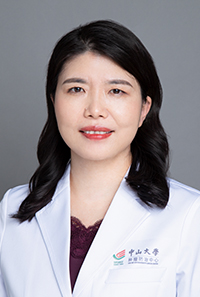- Name: Xing Zhang
- Title: Director and Professor
- Email: zhangxing@sysucc.org.cn
- Phone:
Dr. Xing Zhang is currently a professor and a chief physician of the department of Immunotherapy and Medical Oncology of Melanoma and Sarcoma in Sun Yat-sen University Cancer Center. She specializes in immunotherapy of solid tumor, molecular targeted drug therapy, medical treatment of bone and soft tissue sarcoma and melanoma. She is one of the Guangdong outstanding young medical talents and principle investigator of 5 National Natural Science Foundation projects. She has published dozens of SCI papers as the first author or correspondent author, including Oncogene, Mol Cancer, Br J Cancer, Clin Cancer Res, etc. She has also participated in the draft and development of 3 national medical treatment guidelines.
She served as group leader of chemoradiotherapy group of Sarcoma Professional Committee of China Anticancer Association, the chairman of Sarcoma Professional Committee of Guangdong anticancer association and the standing member of sarcoma Professional Committee of China Anticancer Association. She has many academic titles, including the member of target and individualized treatment special committee of Guangdong anticancer association, the vice chairman of Guangdong Cell Biology Association, the standing member of bone tumor branch of Guangdong Doctor Association, Guangdong Province Standing committee member of biotherapy special committee of anticancer association, the vice chairman of tumor support and rehabilitation treatment professional committee of Guangzhou anticancer association.
Immunotherapy of solid tumor and molecular targeted drug therapy. Medical treatment of bone and soft tissue sarcoma, melanoma.
Dr. Xing Zhang graduated from Henan Medical University in 1994, majoring in clinical medicine. In 2004, she graduated from Sun Yat-sen University with a doctor's degree in oncology. From 2001 to 2003, she studied in the Medical School of Boston University.
Selected publications
1. ALK ATI Interacts With c-Myc and Promotes Cancer Stem Cell-Like Properties in Sarcoma.Xu BS, Chen HY, Que Y, Xiao W, Zeng MS, Zhang X#. Oncogene. 2020 Jan;39(1):151-163.
2. LAG-3 expression on tumor-infiltrating T cells in soft tissue sarcoma correlates with poor survival.Que Y, Fang Z, Guan Y, Xiao W, Xu B, Zhao J, Chen H, Zhang X, Zeng M, Liang Y, Zhang X#. Cancer Biol Med. 2019 May;16(2):331-340.
3. Chimeric Antigen Receptor-Modified T-cell Therapy for Platelet-Derived Growth Factor Receptor α-positive Rhabdomyosarcoma.Xiao W, Wang J, Wen X, Xu B, Que Y, Yu K, Xu L, Zhao J, Pan Q, Zhou P, Zhang X#. Cancer. 2020 May 1;126 Suppl 9:2093-2100.
4. The changing landscape of phase II/III metastatic sarcoma clinical trials-analysis of ClinicalTrials.gov.Que Y, Xiao W, Xu BS, Wen XZ, Weng DS, Zhang X#. BMC Cancer. 2018 Dec 13;18(1):1251.
5. PD-L1 Expression Is Associated with FOXP3+ Regulatory T-Cell Infiltration of Soft Tissue Sarcoma and Poor Patient Prognosis.Que Y, Xiao W, Guan YX, Liang Y, Yan SM, Chen HY, Li QQ, Xu BS, Zhou ZW, Zhang X#. J Cancer. 2017 Jul 5;8(11):2018-2025.
6. Preoperative platelet - lymphocyte ratio is superior to neutrophil-lymphocyte ratio as a prognostic factor for soft-tissue sarcoma. Que Y, Qiu H, Li Y, Chen Y, Xiao W, Zhou Z, Zhang X#. BMC Cancer. 2015 Oct 2;15(1):648.
7. The clinical significance of transforming acidic coiled-coil protein 3 expression in non-small cell lung cancer. Jiang F, Kuang BH, Que Y, Lin ZL, Yuan L, Xiao W, Peng RQ, Zhang XS, Zhang X#. Oncol Rep. 2015 Nov 2.
8. Proline-rich tyrosine kinase 2 and its phosphorylated form pY881 are novel prognostic markers for non-small-cell lung cancer progression and patients' overall survival.Kuang BH, Zhang MQ, Xu LH, Hu LJ, Wang HB, Zhao WF, Du Y, Zhang X#. Br J Cancer. 2013 Sep 3;109(5):1252-63
9. The prognostic value of platelet endothelial cell adhesion molecule-1 in non-small-cell lung cancer patients. Kuang BH, Wen XZ, Ding Y, Peng RQ, Cai PQ, Zhang MQ, Jiang F, Zhang XS, Zhang X#. Med Oncol. 2013 Jun;30(2):536.
10. Sp1 and Sp3 are involved in the full transcriptional activity of centromere protein H in human nasopharyngeal carcinoma cells.Zhao WF, Wang HB, Xie B, Hu LJ, Xu LH, Kuang BH, Li MZ, Zhang X#. FEBS J. 2012 Aug; 279(15):2714-26.
11. Cell aggregation induces phosphorylation of PECAM-1 and Pyk2 and promotes tumor cell anchorage-independent growth. Zhang X, Xu LH, Yu Q. Mol Cancer 2010 Jan 14;9(1):7.
Updated July 2020

